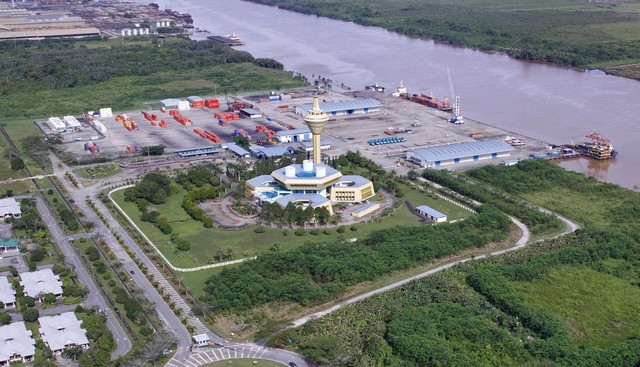This year (2023), the Sarawak Government is embarking on a mission to transform its port services with its very own port master plan.
The first step in developing this long-term plan is to conduct a study, which will be led by the Ministry of Infrastructure and Port Development (MIPD) and will begin with Miri Port Authority (Miri Port).
With an allocation of RM4 million under the 12th Malaysia Plan, the study focuses on improving the efficiency and safety of port services.
It encompasses port consolidation; installation of Vessel Traffic Management System (VTMS), Aids to Navigation (AtoN) facility and cranes; as well as dredging works and exploration of new business opportunities, among other areas.
The initiative is part of broader efforts to achieve a high-income, developed Sarawak by 2023 via Post Covid-19 Development Strategy 2030 by developing and enhancing all of the State’s ports.

Ports are crucial for a nation’s progress, more so in developing ones, given their prominent role in enabling trade and supporting supply chains. Globally, over 80 per cent of traded goods is transported via sea routes and handled by these maritime facilities.
Those with high-quality infrastructure, when operated efficiently, are able to attract investment that can potentially enhance production and distribution systems, subsequently driving economic growth, creating job opportunities, and raising income levels.
At a time where sustainability is a priority for many governments worldwide, they are also essential in supporting crisis response, protecting and conserving the environment, as well as empowering women port workers in order to achieve gender equality in the port sector.
For Sarawak, the Government is aware of and thus recognises how important ports are in the State’s overall development. It is especially prevalent when MIPD was renamed from the Ministry of Infrastructure Development and Transportation in 2018.
While the development of the port master plan is in motion, it is learning from experiences of other countries in port management. For example, ports in Rotterdam (the Netherlands), Shanghai (China) and Adelaide (Australia) will serve as references for Miri Port in its expansion plan.

It comes as the Government has approved an allocation of more than RM230 million to deepen Kuala Baram Delta to reduce congestion at the port, and in the long run transform Miri into an economic hub on par with Bintulu.
Furthermore, during the recent Dewan Undangan Negeri (DUN) sitting in May 2023, Deputy Premier and Minister for Infrastructure and Port Development YB Datuk Amar Douglas Uggah Embas revealed that plans are underway to establish a centralised port authority called Sarawak Ports Authority, involving a restructuring exercise of State port authorities namely Kuching, Tanjung Manis, Rajang, Samalaju and Miri.
“The function is to regulate, streamline, and coordinate the management, operation, planning, and development of all ports to ensure that each of the port plays its niche role in promoting trade and business,” he explained.
Relatively, he stated that efforts are undertaken by the Government to take over Bintulu Port from the Federal Government through negotiations under the MA63 agenda.
By shifting jurisdictions from federal to state, the port can be included in the upcoming centralised port authority, further strengthening the port sector’s ability to contribute or even accelerate future development in Sarawak.
Why the Need for a Port Master Plan?
Port master planning is not a new initiative; various port around the world – from as far as the United States, Mexico and the United Kingdom to as near as Thailand and Singapore – have developed their own port master plans for similar reasons. Among them include:
- Clarifying the port’s medium to long-term strategic planning
- Aiding local and regional planning entities as well as transport network providers in drawing up and amending their own development strategies
- Informing port users, employees and local communities regarding the port’s development for at least the next few years

In general, this plan should not be inflexible due to the dynamic nature of the global economy. Instead, it must be able to adapt to rapid changes without unwarranted bureaucracy in order for the port itself to remain competitive.
Source: Department of Transport, United Kingdom
Considerations in Designing a Sustainable Port Master Plan
Several factors need to be taken into account when developing a port master plan that guarantees sustainability, accountability and transparency, such as:
- Environmental values of the area where the port operates
- Port optimisation, including supply chain infrastructure
- Policy context and regulatory framework
- Social aspects and community well-being
- Ecologically sustainable development
- Feedback following engagement with stakeholders
- Port history and economic trends
Source: The State of Queensland (Department of Transport and Main Roads)
References:
Bernama. (2023, February 18). Sarawak to learn from other countries in managing port. Daily Express Online. https://www.dailyexpress.com.my/news/207846/sarawak-to-learn-from-other-countries-in-managing-port/
Conny, B. (2023. January 11). Majang: Masterplan study seeks to improve efficiency, safety of ports. Borneo Post Online. https://www.theborneopost.com/2023/01/11/majang-masterplan-study-seeks-to-improve-efficiency-safety-of-ports/
Department of Transport. (2008, December). Guidance on the Preparation of Port Master Plans. National Infrastructure Planning. https://infrastructure.planninginspectorate.gov.uk/wp-content/ipc/uploads/projects/TR030001/TR030001-001984-121026_TR030001%20Port%20master%20plan%20guidance.pdf
Humphreys, R.M. (2023, May 17). Why ports matter for the global economy. World Bank Blogs. https://blogs.worldbank.org/transport/why-ports-matter-global-economy
Jenifer, L. (2023, February 16). Premier: RM230 mln set aside to deepen Kuala Baram Delta. Borneo Post Online. https://www.theborneopost.com/2023/02/16/premier-rm230-mln-set-aside-to-deepen-kuala-baram-delta/
Matthew, U. (2023, May 24). Centralised port authority for Sarawak soon, says Uggah. Borneo Post Online. https://www.theborneopost.com/2023/05/24/centralised-port-authority-for-sarawak-soon-says-uggah/
The State of Queensland (Department of Transport and Main Roads). (2022, June 2). Master planning for priority ports. https://www.tmr.qld.gov.au/business-industry/Transport-sectors/Ports/Sustainable-port-development-and-operation/Master-planning-for-priority-ports United Nations Conference on Trade and Development. (2022, May 13). Why ports are at the heart of sustainable development. UNCTAD. https://unctad.org/news/why-ports-are-heart-sustainable-development




